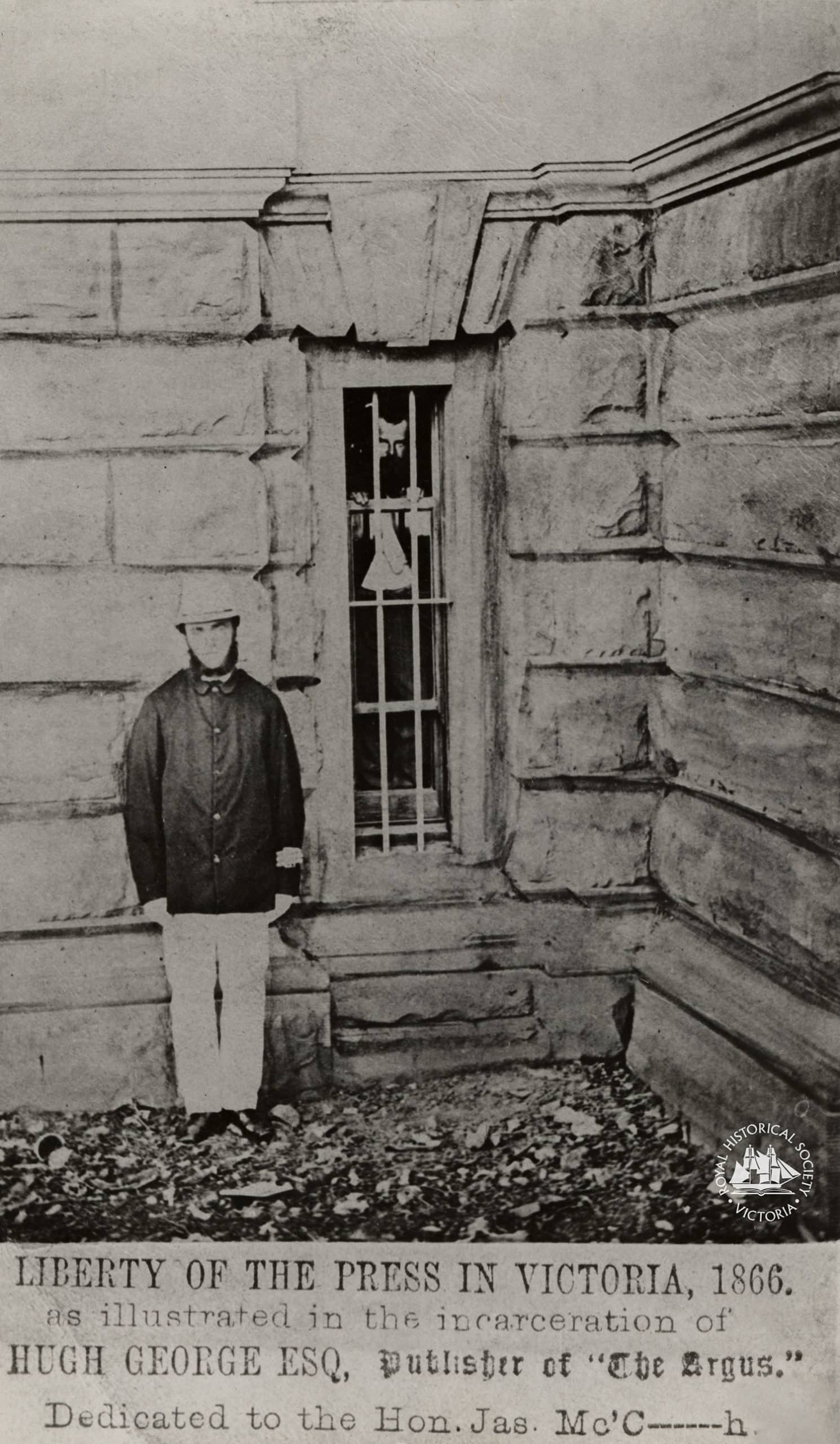
Hugh George, Publisher of The Argus, imprisoned in Parliament House, Melbourne, 1866
The latter half of the nineteenth century in Melbourne was a turbulent time of passionate politics. The hot button issue in 1866 was protectionism. The Chief Secretary (Premier equivalent) James McCulloch was a protectionist as were the majority of the Legislative Assembly. The ‘squatocratic’ Legislative Upper House supported free traders. Battle lines were drawn over proposed tariff legislation. After the Legislative Council rejected a tariff proposal comfortably passed by the Assembly for a second time the Chief Secretary and Ministers resigned.
The Argus responded to the crisis with an article beginning“The statement of the Chief Secretary when announcing yesterday afternoon, the resignation of Ministers fairly bristled with falsehood and formed a fitting denoument to the career of a Cabinet which has been marked, with little variation, by deceit, chicane and lawlessness” (Trove, The Argus, Friday 16 March 1866, p.4)
This entirety of this broadside does not seem to be the offence that caused Parliament to “pronounce the language used as a scandalous breach of the House” (Trove, The Argus Wednesday March 21 1866, p.4) and summons Hugh George, it was only the claim that the Chief Minister’s statement “bristled with falsehood”. Hugh George was a printer at The Times of London and, along with a group of compositors affectionately known as ‘the forty thieves’, was bought to Melbourne in 1852 by The Argus to overcome a shortage of skilled labour. As head printer he was considered publisher, although he had no input to content, and thus was he summoned to Parliament. The writer of the article was not named and no one has ever claimed authorship.
After much debate by the House and a statement by George that he considered the comment fair criticism he was ordered into custody. Mr. George was offered the option of release “on payment of fees” but “he protested against the injustice of his imprisonment and refused to make any payment with a view to his discharge” (The Australasian quoted in Press, Vol.IX , issue 1070, 13 April 1866, p.2 National Library of New Zealand) and was confined to a cell in the basement of Parliament for a period of around three weeks.
The grim and sorry image of Mr Hughes in the photograph does not, however, tell the full story of his imprisonment. The cell in which he was required to sleep located in the basement of Parliament and described by Mr. George as a ‘dungeon’ was indeed miserable and unhealthy. Dr. Edward Barker reporting on the situation wrote, “I find it damp, having a disagreeable odour … it is impossible that the small window can be opened, to allow of air (If pure) to enter, but as the window is close to a urinal, the air is tainted by it” (The Australasian quoted in Press, Vol.IX , issue 1070, 13 April 1866, p.2 National Library of New Zealand)
George Hughes’ days, however, were considerably more jolly than his nights.Of his day time accommodation the equally illustrious Dr. Thomas notes, “I found his sitting-room commodious, cheerful and wholesome, having a free ingress of air. He has a moderate space allotted to him on the roof for exercise, from which he obtains a most beautiful panoramic view of Melbourne and the surrounding country. His living is excellent. He has the best of viands and the choicest of wine. So far I would not mind exchanging places with him for a short period.” (The Australasian quoted in Press, Vol.IX , issue 1070, 13 April 1866, p.2 National Library of New Zealand)
Nor was he lacking in social contact; “On Tuesday afternoon the compositors of “The Argus” office, numbering about fifty, waited upon Mr. George in a body, to express their sympathy and respect” (The Australasian quoted in Press, Vol.IX , issue 1070, 13 April 1866, p.2 National Library of New Zealand)
In a statement intended for the public Hugh George notes, “During Wednesday and Thursday I was visited by a large number of friends, including nearly all the Opposition members and some Ministerialists.”
When challenged by the Sergeant-at-Arms about the cost of this revelry Hughes replied, “I [have] a great many friends coming to see me and that I wished to entertain them; and that if I did exceed the specified five pounds a day “The Argus” was able enough and willing enough to pay for it” (The Australasian quoted in Press, Vol.IX , issue 1070, 13 April 1866, p.2 National Library of New Zealand). He was even paid a social call by George Higinbotham, Attorney General in the McCulloch government that imprisoned him.
Every picture tells a story, but sometimes more than one.

 239 A'Beckett Street Melbourne, Victoria, 3000
239 A'Beckett Street Melbourne, Victoria, 3000  03 9326 9288
03 9326 9288  office@historyvictoria.org.au
office@historyvictoria.org.au  Office & Library: Weekdays 9am-5pm
Office & Library: Weekdays 9am-5pm

